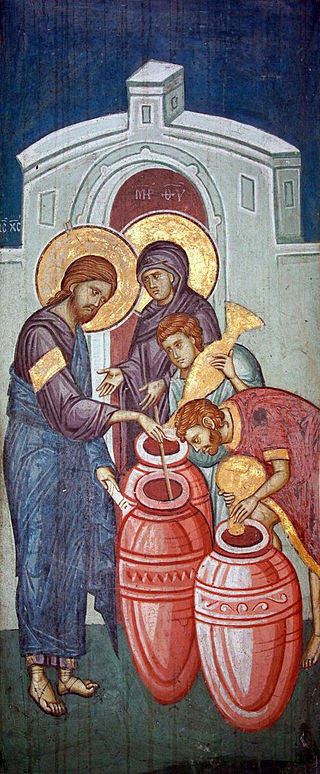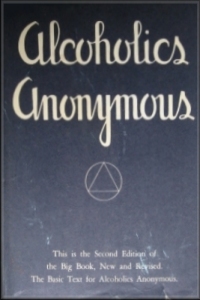
Alcoholics Anonymous (AA) is a global peer-led mutual aid fellowship begun in the United States dedicated to abstinence-based recovery from alcoholism through its spiritually inclined twelve-step program. Besides stressing anonymity, AA's twelve traditions establish it as free to all, non-professional, unaffiliated and non-denominational, as well as apolitical with a public relations policy of attraction rather than promotion. In 2020 AA estimated a worldwide membership of over two million, with 75% of those in the US and Canada.

Prohibition is the act or practice of forbidding something by law; more particularly the term refers to the banning of the manufacture, storage, transportation, sale, possession, and consumption of alcoholic beverages. The word is also used to refer to a period of time during which such bans are enforced.

The temperance movement is a social movement promoting temperance or complete abstinence from consumption of alcoholic beverages. Participants in the movement typically criticize alcohol intoxication or promote teetotalism, and its leaders emphasize alcohol's negative effects on people's health, personalities and family lives. Typically the movement promotes alcohol education and it also demands the passage of new laws against the sale of alcohol, either regulations on the availability of alcohol, or the complete prohibition of it.

The Prohibition Party is a political party in the United States known for its historic opposition to the sale or consumption of alcoholic beverages and as an integral part of the temperance movement. It is the oldest existing third party in the United States and the third-longest active party.

Sobriety is the condition of not having any effects from alcohol and other drugs. Sobriety is also considered to be the natural state of a human being at birth. A person in a state of sobriety is considered sober. Organizations of the temperance movement have encouraged sobriety as being normative in society.
Neo-prohibitionism is a current movement to attempt to stop consumption of alcohol in society through legislation and policies which further restrict the sale, possession, and marketing of alcohol in order to reduce average per capita consumption and change social norms to reduce its acceptability.
In the United States, the nationwide ban on alcoholic beverages, was repealed by the passage of the Twenty-first Amendment to the United States Constitution on December 5, 1933.
The National Temperance Society and Publishing House was a publishing house which advocated personal alcohol temperance and a governmental ban on the personal consumption of alcohol. It was based in New York City.
The Martha Washingtonians were a group of working class women of the early 19th century committed to the idea of encouraging temperance. The organization was an outgrowth of the Washingtonian temperance movement. As an organization, it was composed of wives, sisters, aunts, daughters and other female relatives of drunken men.

Christian views on alcohol are varied. Throughout the first 1,800 years of Church history, Christians generally consumed alcoholic beverages as a common part of everyday life and used "the fruit of the vine" in their central rite—the Eucharist or Lord's Supper. They held that both the Bible and Christian tradition taught that alcohol is a gift from God that makes life more joyous, but that over-indulgence leading to drunkenness is sinful. However, the alcoholic content of ancient alcoholic beverages was significantly lower than that of modern alcoholic beverages. The low alcoholic content was due to the limitations of fermentation and the nonexistence of distillation methods in the ancient world. Rabbinic teachers wrote acceptance criteria on consumability of ancient alcoholic beverages after significant dilution with water, and prohibited undiluted wine.
Drug addiction recovery groups are voluntary associations of people who share a common desire to overcome their drug addiction. Different groups use different methods, ranging from completely secular to explicitly spiritual. Some programs may advocate a reduction in the use of drugs rather than outright abstention. One survey of members found active involvement in any addiction recovery group correlates with higher chances of maintaining sobriety. Although there is not a difference in whether group or individual therapy is better for the patient, studies show that any therapy increases positive outcomes for patients with substance use disorders. The survey found group participation increased when the individual members' beliefs matched those of their primary support group. Analysis of the survey results found a significant positive correlation between the religiosity of members and their participation in twelve-step programs and to a lesser level in non-religious SMART Recovery groups, the correlation factor being three times smaller for SMART Recovery than for twelve-step addiction recovery groups. Religiosity was inversely related to participation in Secular Organizations for Sobriety.

LifeRing Secular Recovery is a secular, non-profit organization providing peer-run addiction recovery groups. The organization provides support and assistance to people seeking to recover from alcohol and drug addiction, and also assists partners, family members and friends of addicts or alcoholics. It is an abstinence-based recovery program with three fundamental principles: sobriety, secularity and self-empowerment. The motto of LifeRing is "empower your sober self."

Secular Organizations for Sobriety (SOS), also known as Save Our Selves, is a non-profit network of autonomous addiction recovery groups. The program stresses the need to place the highest priority on sobriety and uses mutual support to assist members in achieving this goal. The Suggested Guidelines for Sobriety emphasize rational decision-making and are not religious or spiritual in nature. SOS represents an alternative to the spiritually based addiction recovery programs such as Alcoholics Anonymous (AA). SOS members may also attend AA meetings, but SOS does not view spirituality or surrendering to a Higher Power as being necessary to maintain abstinence.

Alcoholics Anonymous: The Story of How More Than One Hundred Men Have Recovered from Alcoholism is a 1939 basic text, describing how to seek recovery from alcoholism. The Big Book was written by William G. "Bill W." Wilson, one of the founders of Alcoholics Anonymous, with the help of various editors. The composition process was not collaborative other than editing. Bill wrote all of the chapters except for "To Employers" which was written by Bill's right-hand man, Hank Parkhurst. Parkhurst influenced the more liberal notions of "God as we understand him" and "your own conception of God." Drafts of sections were sent back and forth between Bill W.'s group in New York and Robert Holbrook Smith, the other AA founder, in Akron, Ohio. Dr. Bob made no major changes. It is the predecessor of the seminal "twelve-step method" widely used to treat many addictions, from alcoholism, heroin addiction and marijuana addiction to overeating, sex addiction and gambling addiction, with a strong spiritual and social emphasis. It is one of the best-selling books of all time, having sold 30 million copies. In 2011, Time magazine placed the book on its list of the 100 best and most influential books written in English since 1923, the year in which the magazine was first published. In 2012, the Library of Congress designated it as one of 88 "Books that Shaped America."
Richard Rogers Peabody was an American psychotherapist who specialized in alcoholism.
Temperance – moderation, self-restraint, esp in eating and drinking, moderate use of, or total abstinence from, alcoholic liquors as beverages; ~ society etc. for restriction or abolition of use of alcoholic drinks. L temperantia.

In the United States, the temperance movement, which sought to curb the consumption of alcohol, had a large influence on American politics and American society in the nineteenth and twentieth centuries, culminating in the prohibition of alcohol, through the Eighteenth Amendment to the United States Constitution, from 1920 to 1933. Today, there are organizations that continue to promote the cause of temperance.
The temperance movement in the United Kingdom was a social movement that campaigned against the recreational use and sale of alcohol, and promoted total abstinence (teetotalism). In the 19th century, high levels of alcohol consumption and drunkenness were seen by social reformers as a danger to society's wellbeing, leading to social issues such as poverty, child neglect, immorality and economic decline. Temperance societies began to be formed in the 1830s to campaign against alcohol. Specific groups were created over periods of time dedicated to the different aspects of drinking. For example, in 1847, the Band of Hope was created to persuade children not to start drinking alcohol. Most of these temperance groups were aimed at the working class. Temperance was also supported by some religious groups, particularly the Nonconformist Churches. Although the temperance movement met with local success in parts of Britain, it failed to impose national prohibition, and disappeared as a significant force following the Second World War.

Teetotalism is the practice or promotion of total personal abstinence from the consumption of alcohol, specifically in alcoholic drinks. A person who practices teetotalism is called a teetotaler or teetotaller, or is simply said to be teetotal. Globally, almost half of adults do not drink alcohol. A number of temperance organisations have been founded in order to promote teetotalism and provide spaces for non-drinkers to socialise.

Norman Shanks Kerr was a Scottish physician and social reformer who is remembered for his work in the British temperance movement. He originated the Total Abstinence Society and was founder and first president of the Society for the Study and Cure of Inebriety which was founded in 1884.











